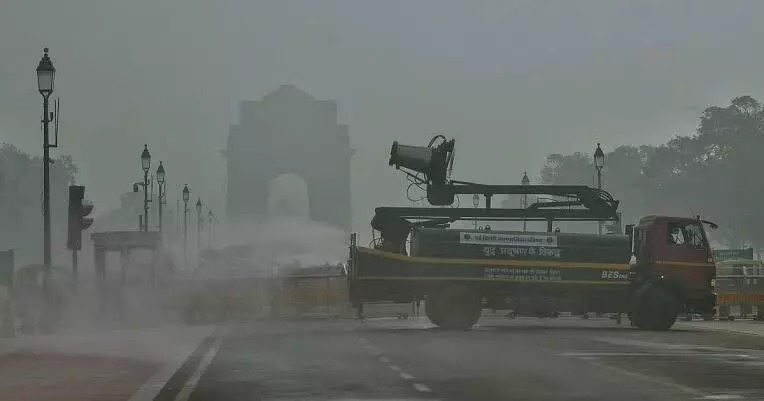Delhi to have 106 additional buses, 60 extra trips by metro trains to combat air pollution
On Friday the city's air quality was in the severe category with an AQI of 411 at 9 am
By Newsmeter Network
Delhi to have 106 additional buses, 60 extra trips by metro trains to combat air pollution
New Delhi: Delhi Environment Minister Gopal Rai on Friday said an additional 106 cluster buses would ply in the city while metro trains would make 60 extra trips in view of GRAP-3 measures imposed due to worsening air quality.
The Commission for Air Quality Management (CAQM) has imposed GRAP 3 measures as the national capital recorded the worst pollution levels in the country, with the air quality remaining in the "severe" category for two consecutive days.
On Friday the city's air quality was in the severe category with an AQI of 411 at 9 am.
Delhi Environment Minister, addressing a press conference said that the Air Quality Index (AQI), which has consistently crossed hazardous levels, led to the enforcement of GRAP-3.
"We are working to make GRAP-3 more effective in Delhi," the minister said, adding that a meeting was held with officials from MCD, PWD, transport, DTC, metro, and education departments to review and implement urgent measures.
As part of the action plan, the Delhi government has banned the entry of non-CNG inter-state buses into the city.
Only electric buses and those running on CNG will be allowed entry. In addition, BS-III petrol and BS-IV diesel four-wheelers have been prohibited, Rai said.
To ensure enforcement, the transport department has deployed 84 teams, with an additional 280 transport police personnel, to monitor violations. A fine of Rs. 20,000 will be imposed for any breaches of the new rules.
The minister highlighted that to reduce vehicular pollution, 106 new cluster bus services have been introduced. Among these, 40 buses have been specifically launched for government employees residing in various parts of the city to discourage the use of private vehicles.
The routes will include key areas such as Nehru Place, Rohini, Dwarka, Janakpuri, Shahdara and others.
The GRAP for Delhi-NCR is divided into four stages of air quality - Stage 1 for “poor” Air Quality Index (AQI) ranging between 201 and 300, Stage 2 for “very poor” AQI of 301-400, Stage 3 for “severe” AQI of 401-450 and Stage 4 for “severe plus” AQI more than 450.
Curbs under Stage III include a ban on non-essential construction and demolition and closure of stone crushers and mining activities in the Delhi-National Capital Region (NCR).
Under the Stage-IV restrictions of GRAP, all inter-state buses from NCR states - except electric vehicles, CNG vehicles and BS-VI diesel buses-will be prohibited from entering Delhi, alongside a stringent ban on construction and demolition activities, suspension of mining-related activities, consideration of shifting to online classes for students up to Class V and daily water sprinkling on major roads.
To further reduce traffic emissions, metro services will increase by 60 additional trips, and road cleaning efforts will be enhanced with 65 dust suppression machines deployed by the MCD.
Moreover, 200 mobile anti-smog guns will be used in three shifts for water sprinkling on roads, with designated drivers in each shift to ensure continuous operations.
Meanwhile, the Delhi government is also taking steps to regulate construction activities, banning private construction and demolition works, and restricting non-essential work. Public and government services, however, will continue as usual, Rai said.
Addressing the media, the minister urged residents to use a cycle for short distances, rely on public transport, carpool, and work from home whenever possible to help reduce pollution levels.
If the air quality deteriorates further, the minister mentioned that emergency measures, including artificial rain, would be considered. "We will seek support from the Centre if required," he added.
Inputs from PTI